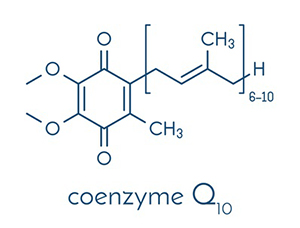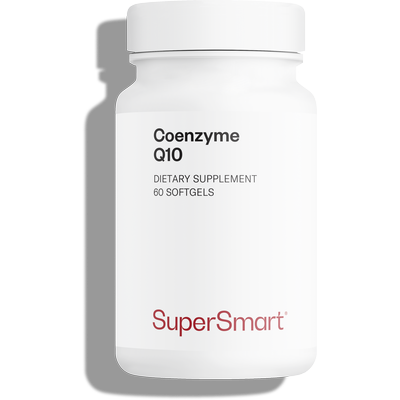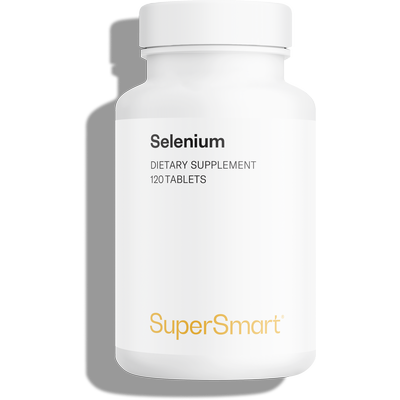Twelve years later, this four-year supplementation is still bringing benefits: the fascinating power of epigenetics

A study published on 21 August 2018 has shown that the benefits of supplementing with selenium and coenzyme Q10 continue to be felt 12 years after the supplementation stopped. Individuals who over a decade ago took these supplements for four years still have a 40% lower risk of cardiovascular mortality today compared with those in the original control group. This means that structural changes must have taken place in the supplemented group and that these changes are still in place.
The power of coenzyme Q10 and selenium to prevent heart disease
The original study involved 443 healthy volunteers aged 50+, divided into two groups. Those in the first group took a daily dose of 200mg of coenzyme Q10 and 200mcg of selenium for four years, while the second group were given tablets containing no active principle. After more than 12 years of follow-up, the researchers found that those in the first group had a 40% lower cardiovascular mortality risk than those in the placebo group, and that the extent of the benefits increased over time. Using echocardiography, they also found increasing differences in cardiac function. "The effects are remarkably persistent, especially in women", commented Dr. Mark Miller, a director of Kaiviti Consulting LLC. "This is true even for at-risk individuals with diabetes, hypertension or severe heart dysfunction, for example. But what’s amazing is that the differential between the supplemented and non-supplemented groups is getting wider over time and that the benefits are increasing."
What is the mechanism responsible for such enduring effects? It may be that the selenium and coenzyme Q10 have irreversibly changed the way genes are read and used without denaturing them. These molecules are called epigenetic factors - they are able to tell a cell which genes to use and which to be set aside. According to the theory put forward by Dr. Miller, selenium and coenzyme Q10 may have influenced gene expression and led the supplemented volunteers down a different path – a less risky one in terms of cardiovascular health and one which moved ever further from that taken by the control group. These substances are believed to have modified the expression of genes linked to oxidative stress, inflammation and mitochondrial function.
The reason we are lacking in selenium is soil impoverishment

Selenium is essential for human health, though we only need tiny amounts for the body to function properly. We have to obtain it from the diet as we’re unable to produce it. This trace-element plays a key role in the immune system and thyroid function, but above all, it helps the body to produce endogenous antioxidants such as glutathione-peroxidase, as well as various selenoproteins. These work tirelessly to protect our cells from free radical-induced oxidation.
European soil, unlike that in the United States or Canada, is particularly depleted in selenium (1-2). This is a problem because the selenium content of cereals and vegetables directly depends on that of the soil in which they are grown. Selenium serum concentrations among European populations are thus consistently below 90 μg/L while scientists estimate that for optimal production of selenoproteins, they need to be between 90 μg/L and 140 μg/L (3). That’s why in 1984, Finland began using selenium-enriched fertiliser, which led to a threefold increase in dietary intake and reduced the country’s incidence of heart disease. In the UK, selenium intake has fallen from 60 µg/day to 34 µg/day in less than 20 years (4).
Low serum concentrations of selenium are associated with loss of muscle strength, higher levels of disability and an increased risk of cardiovascular problems.
Why are we also lacking in co-enzyme Q10?
 Unlike selenium, coenzyme Q10 is produced by the body but it is still vital for optimal function. It’s a powerful antioxidant which is critical for producing cellular energy, particularly the famous energy molecule, ATP. It has been widely studied for the role it plays in cognitive and cardiovascular health and in ageing, even if it is still considered a food supplement rather than a medicine because it’s a natural molecule that cannot be the object of a pharmaceutical patent. Though it can be synthesised by the body, production starts to decline after the age of 20, and will have halved by the age of 80, in heart muscle tissue (5).
Unlike selenium, coenzyme Q10 is produced by the body but it is still vital for optimal function. It’s a powerful antioxidant which is critical for producing cellular energy, particularly the famous energy molecule, ATP. It has been widely studied for the role it plays in cognitive and cardiovascular health and in ageing, even if it is still considered a food supplement rather than a medicine because it’s a natural molecule that cannot be the object of a pharmaceutical patent. Though it can be synthesised by the body, production starts to decline after the age of 20, and will have halved by the age of 80, in heart muscle tissue (5).
A number of studies have shown that coenzyme Q10 can reduce systolic and diastolic blood pressure with no undesirable effects noted at doses of 120-200mg a day. It is considered completely safe, even when used for very long periods, because it is naturally present in the body (6).
Synergy between selenium and coenzyme Q10
Research has demonstrated the synergistic reaction that occurs between selenium and coenzyme Q10 (7). Sufficient quantities of coenzyme Q10 are required to produce functional selenoproteins, while selenium is needed to activate coenzyme Q10 molecules. Europeans aged over 50 are thus at particular risk of deficiency of both selenium (which is associated with higher cardiovascular mortality (8)) and coenzyme Q10 (due to a fall in endogenous production). Such individuals are thus losing out on the powerful synergy between these substances which can provide lasting protection against cardiovascular problems.
How can this be addressed?
The best way of preventing cardiovascular problems is to help the body use its natural defences as effectively as possible. To do that, you can take the same supplementation path as the participants of the above-mentioned study, adding in a few extra measures.
- Take 3-6 softgels a day of Coenzyme Q10 30 mg with meals. This supplement is delivered on a lipid base to facilitate absorption of the molecule by the body. As it’s a difficult molecule to produce and therefore expensive, it’s important to make sure your supplement provides maximum bioavailability …
- Take one tablet a day of L-Selenomethionine 200 mcg with lunch or dinner. If you live in the Americas, your selenium intake may be adequate so it’s advisable to consult a health professional first.
- Make sure you lose weight if you’re carrying any excess pounds, particularly around the abdomen: this type of visceral fat is the most dangerous for the heart. Waist circumference should ideally be lower than 94cm for men and 80cm for women. Yoga appears to be a useful way of achieving this: its association with preventing the onset and recurrence of cardiovascular disease (9) is primarily due to its ability to prevent age-related weight gain.
- Devote 20 minutes a day to relaxing, deep breathing and eliminating stress, ideally in the morning or an hour before bed.
- Make sure you have a sufficient intake of omega-3 fatty acids: at least 500mg for healthy individuals (that’s 2-3 servings of fish a week) and 800mg-1000mg for those suffering from cardiovascular problems (that’s 2-3 servings of fish a week plus a good quality omega-3 supplement) (10). Recently, the EFSA officially recognised omega-3 fatty acids as having a beneficial effect on cardiovascular health.
Study at the centre of this article
Alehagen, Urban et al. “Still Reduced Cardiovascular Mortality 12 Years after Supplementation with Selenium and Coenzyme Q10 for Four Years: A Validation of Previous 10-Year Follow-up Results of a Prospective Randomized Double-Blind Placebo-Controlled Trial in Elderly.” Ed. Doan TM Ngo. PLoS ONE 13.4 (2018): e0193120. PMC. Web. 21 Aug. 2018.
References
- Rayman MP. Selenium and human health. Lancet. 2012;379(9822):1256–68. Epub 2012/03/03. doi: 10.1016/S0140-6736(11)61452-9 .
- U.S. Department of Agriculture ARS. Nutrient Intakes from Food: Mean amounts conusmed per individual, one day, 2005–2006. www.ars.usda.gov/ba/bhnrc/fsrg
- Van Cauwenbergh R, Robberecht H, Van Vlaslaer V, Deelstra H. Comparison of the serum selenium content of healthy adults living in the Antwerp region (Belgium) with recent literature data. J Trace Elem Med Biol. 2004;18(1):99–112. Epub 2004/10/19. doi: 10.1016/j.jtemb.2004.04.004 .
- Rayman MP. Dietary selenium: time to act.BMJ. 1997 Feb 8;314(7078):387-8. Texte intégral : http://bmj.bmjjournals.com
- Kalen A, Appelkvist EL, Dallner G. Age-related changes in the lipid compositions of rat and human tissues. Lipids. 1989;24(7):579–84. Epub 1989/07/01
- Hidaka T, Fujii K, et al. Biofactors. Safety assessment of coenzyme Q10 (CoQ10). 2008;32(1-4):199-208. Review.
- Xia L, Nordman T, Olsson JM, Damdimopoulos A, Bjorkhem-Bergman L, Nalvarte I, et al. The mammalian cytosolic selenoenzyme thioredoxin reductase reduces ubiquinone. A novel mechanism for defense against oxidative stress. J Biol Chem. 2003;278(4):2141–6. doi: 10.1074/jbc.M210456200 .
- Alehagen U, Johansson P, Bjornstedt M, Rosen A, Post C, Aaseth J. Relatively high mortality risk in elderly Swedish subjects with low selenium status. Eur J Clin Nutr. 2016;70(1):91–6. doi: 10.1038/ejcn.2015.92
- Jayasinghe SR. Yoga in cardiac health (a review). Eur J Cardiovasc Prev Rehabil 2004 Oct;11(5):369-75.
- Hooper L, Thompson RL, et al. Risks and benefits of omega 3 fats for mortality, cardiovascular disease, and cancer: systematic review. BMJ. 2006 Apr 1;332(7544):752-60.

Excellent supplement containing the important compound CoQ10, heart concentrations of which decline with age
www.supersmart.comAll rights reserved
Free
Thank you for visiting our site. Before you go
REGISTER WITHClub SuperSmart
of exclusive benefits:
- Free: our weekly science-based newsletter "Nutranews"
- Special offers for club members only















